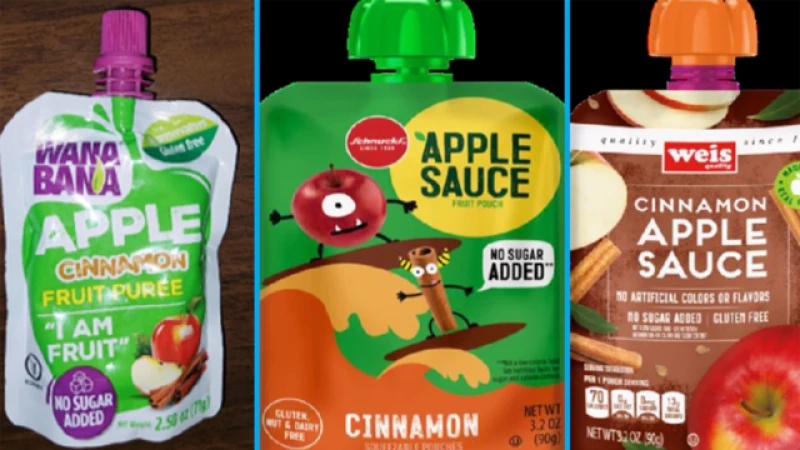Investigation Launched into Lead Poisonings Linked to Contaminated Applesauce
Health authorities are now investigating at least 205 cases of lead poisonings across 33 different states linked to contaminated applesauce, according to a statement released by the Centers for Disease Control and Prevention.
The number of reported cases has risen from 125 in the agency's previous weekly tally, indicating a growing concern over the issue.
The Food and Drug Administration (FDA) is currently conducting an investigation to determine the source of the tainted cinnamon responsible for the contamination. However, the FDA has faced challenges in Ecuador, where its jurisdiction is limited and it cannot take direct action to investigate some of the suspected individuals involved in the poisonings.
In addition to the previously affected states, state health departments in Alabama, Arkansas, Georgia, Maine, Michigan, Missouri, Montana, North Dakota, Pennsylvania, Virginia, and Washington have now reported cases to the CDC. This brings the total number of states affected to more than 20.
Federal officials have urged state health departments to actively seek out cases of lead poisonings. They emphasize the importance of blood tests from doctors to detect the presence of the toxic heavy metal, as cases may go unnoticed if individuals who consumed the lead-tainted applesauce do not undergo testing.
Recent reports have shown that the majority of cases involving lead poisonings have occurred in young children, who are particularly susceptible to developmental issues caused by lead exposure. According to records released by the FDA in response to a request from CBS News, some young children have been consuming the recalled WanaBana, Weis, and Schnucks brand cinnamon-flavored applesauce pouches multiple times a day.
AustroFood, the manufacturer of the recalled products, announced on Monday that it will reimburse customers up to $150 for lead tests. They have also been struggling to remove the pouches from store shelves following the initial recall in late October.
In an update on Monday, the FDA stated that recalled WanaBana Apple Cinnamon Puree products were still found on the shelves of several Dollar Tree stores in multiple states as of December 13. This indicates a challenge in effectively removing the recalled products from circulation.
One potential theory for the contamination is "economically motivated adulteration."
Testing conducted by FDA investigators at AustroFood's plant in Ecuador revealed that the cinnamon added to the applesauce pouches was contaminated with "extremely high" concentrations of lead, reaching levels as high as 5,110 parts per million. This is significantly above the safe maximum level of lead in spices, according to experts.
A recent congressional report has raised concerns about dangerous lead levels in baby food, particularly in relation to concentrations that are significantly smaller than previously believed. The report calls for stricter measures to address this issue.
The Food and Drug Administration (FDA) has been investigating the possible contamination of cinnamon in baby food as a result of economically motivated adulteration, also known as "food fraud." This occurs when individuals or companies substitute ingredients or add fillers to increase profitability. The FDA spokesperson did not disclose any other theories being pursued by investigators.
Similar incidents involving spices like turmeric have been suspected in the past, with sellers attempting to enhance weight and color by contaminating the products.
The contaminated cinnamon is believed to have been supplied by Negasmart, a distributor in Ecuador, through a now-closed grinder in the country.
However, the FDA is relying on officials in Ecuador to support the investigation into Negasmart, as the company did not directly ship its products to the U.S. The FDA is currently awaiting information from Ecuador, which has experienced a recent change in leadership.
The FDA had been awaiting responses from Ecuador's regulatory authorities regarding the contaminated cinnamon, according to an official. To trace the contamination, the FDA relied on the Agencia Nacional de Regulación, Control y Vigilancia Sanitaria (ARCSA), the regulatory counterpart in Ecuador. ARCSA recently swore in a new director on Dec. 6.
The FDA and state authorities have tested over a hundred other food samples for lead, and all have tested negative, including other non-cinnamon flavors of WanaBana that ARCSA initially claimed could also be contaminated.
The FDA states that AustroFood, a company exporting food to the U.S., was Negasmart's sole customer. However, cinnamon imports from other sources that were screened by the FDA did not show elevated levels of lead.
According to the FDA, ARCSA informed them that testing conducted on cinnamon imports from other companies in Ecuador did not indicate contamination with lead.
The FDA expressed their ongoing collaboration with Ecuadorian officials, who are conducting their own investigations to determine the source of contamination.







